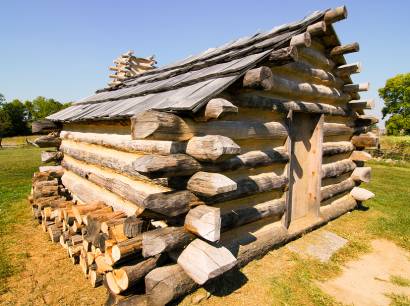This Week's Story
Lafayette learned disciplines of hardship unlike any he had as an aristocrat.

This Week’s Story relives American history and the Bible through brief inspiring stories presented on mp3 audio recordings and text for reading.
Lafayette in the School of Hard Knocks, part four
Lafayette was proud to be a divisional commander and believed his skills were good for his new responsibility. Within two months of being shot, he was in military action and leading troops.
In letters his wife plead with him to come home to France. His in-laws wanted him home. His two-year old daughter did not know him. Lafayette was not ready to go home! He was determined to stay helping American patriots win their freedom from Britain.
He was ordered to join the staff of George Washington, Commander-in-Chief of the Continental Army, at Valley Forge. Less than twenty-five miles away, the British Army occupied Philadelphia, the former capital of the new United States. Six days before Christmas, December 19, 1777, Washington led his troops into the valley for a six-month winter encampment.
His soldiers were too weary to fight. Horrifying problems soon developed at Valley Forge. Congress was the main culprit for the crisis. The legislators did not understand how the soldiers were suffering when fresh supplies did not reach them. Not enough money was appropriated by Congress to buy supplies.
Several previous leaders of Congress were working on other war-related projects. Ben Franklin was in France building support for the Americans. The current Congress took Washington’s reports and requests lightly. Their apathy was tragic.
Congressmen griped that the soldiers should be fighting to get Philadelphia under American control. Some declared, “Washington needs to be removed as Commander-in-Chief.” A plot began to develop against Washington. Lafayette remained strongly loyal to him.
The soldiers lacked food, shoes, blankets, sanitation, and munitions. Several deserted. Nearly 2,000 soldiers died. Two-thirds died from such diseases as influenza, typhus, typhoid, and dysentery.
The core of enlisted soldiers and closest officer aides were intensely loyal to their Commander-in-Chief, and he was loyal to them and their shared mission for liberty. They saw that when they first came to camp in cold December, Washington stayed in a tent, until his men had housing. They watched and talked with him as he rode by horseback among them almost daily for months.
Lafayette, now twenty years old, was there in December and January with his men. He lived among them during the coldest part of the winter, when temperatures averaged 33 degrees Fahrenheit.
He wrote later, “The unfortunate soldiers were in want of everything; they had neither coats, hats, shirts, nor shoes; their feet and legs froze till they had become almost black, and it was often necessary to amputate them.”
Lafayette learned disciplines of hardship unlike any he had as an aristocrat. He watched Washington lead through making personal sacrifices. When Lafayette visited France in 1779, he raised money for the American war effort and encouraged the French king to send more troops to help the Americans. Already the French had signed an alliance with the United States the year before. Both in France and the United States Lafayette’s devotion to the American cause was evident and convincing.
This is Barbara Steiner with a Frenchman named Lafayette. Every week there is a story for you on the website thisweeksstory.com.
<< previous story] [next story >>
We invite your comments! [click here to comment]
This Week's Story is a non-profit supported by listeners. [click here to make a donation]
 click here to play audio
click here to play audio